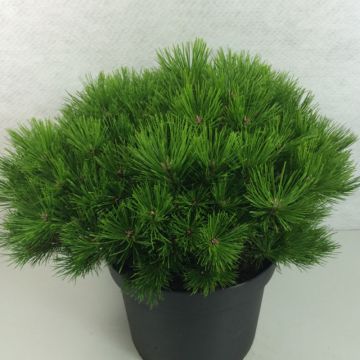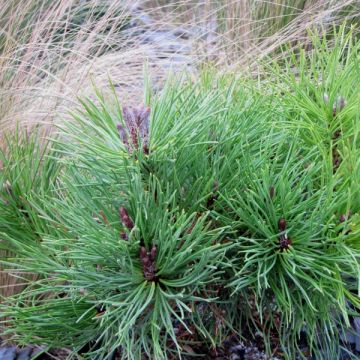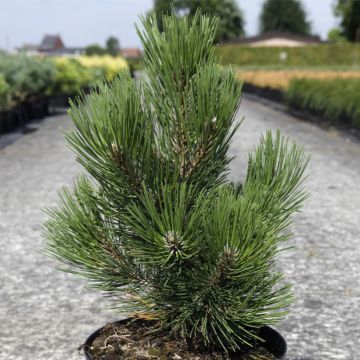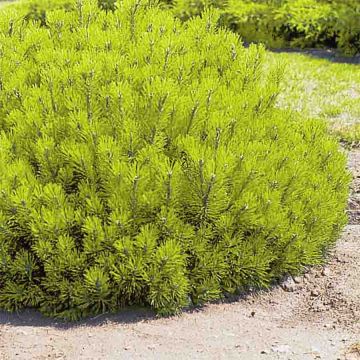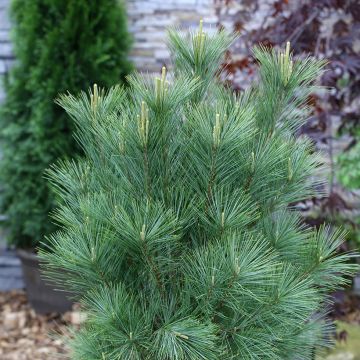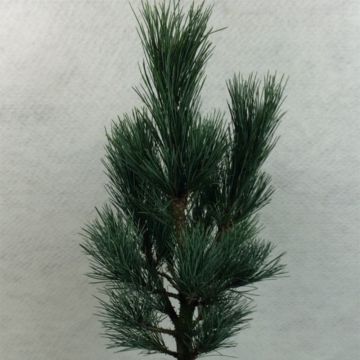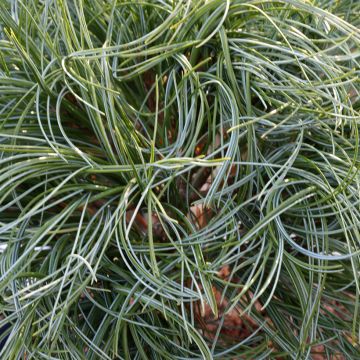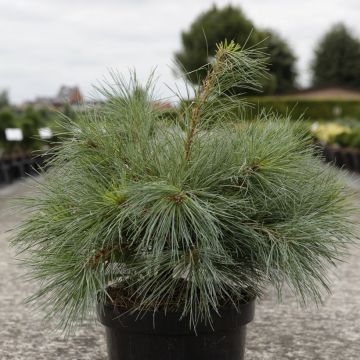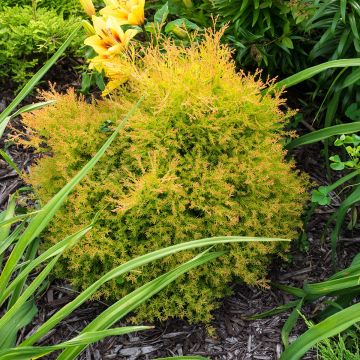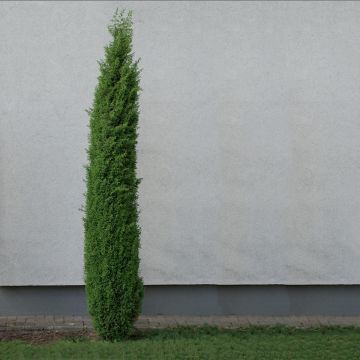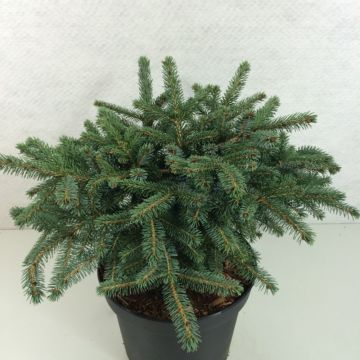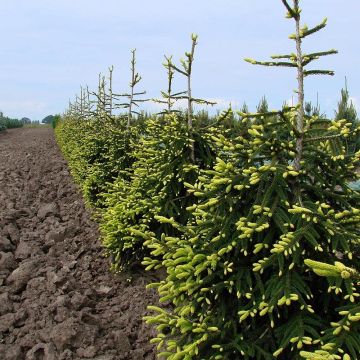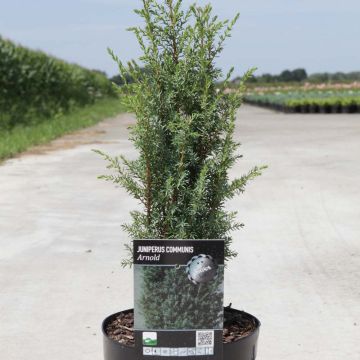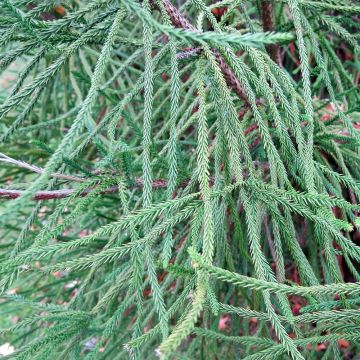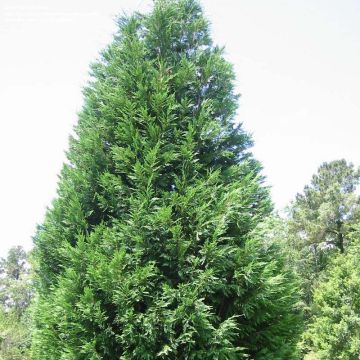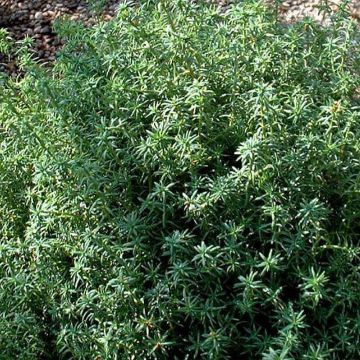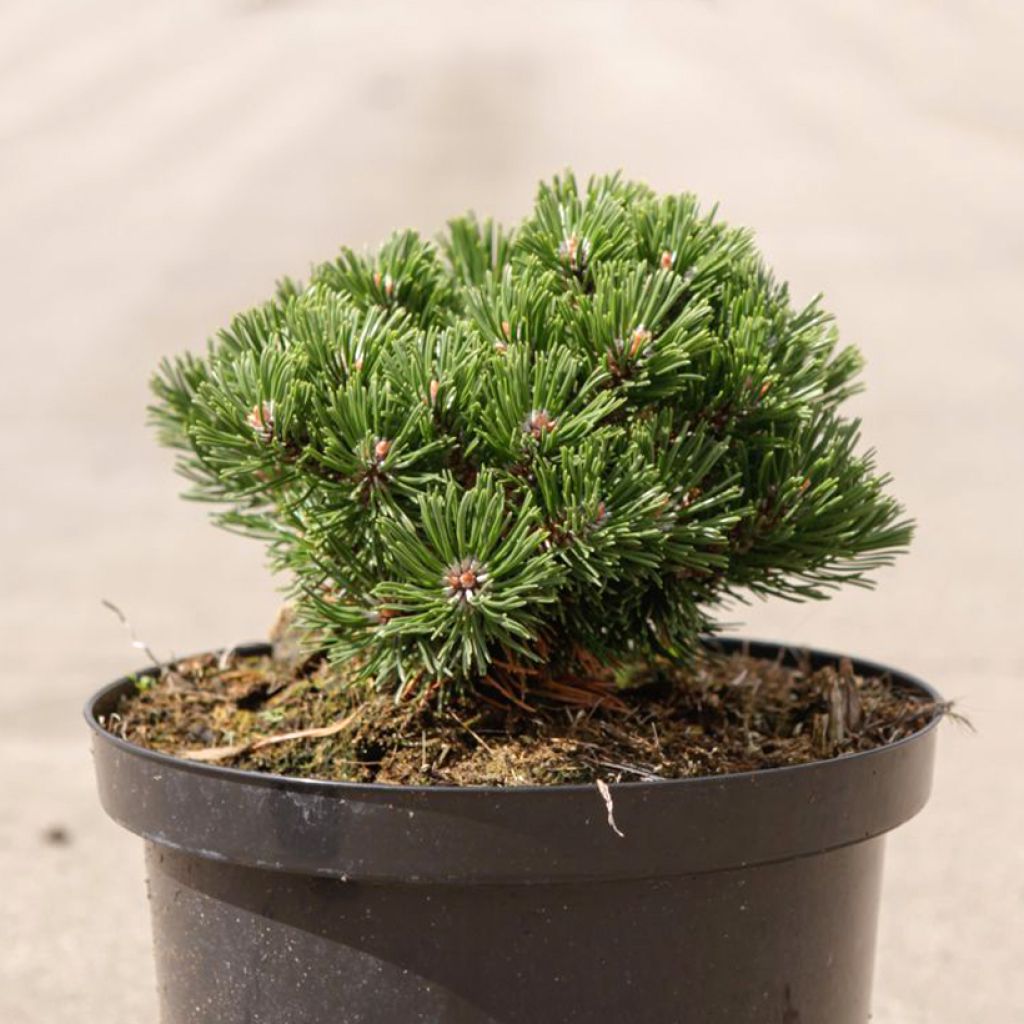

Pinus mugo Sherwood Compact - Dwarf Mountain Pine
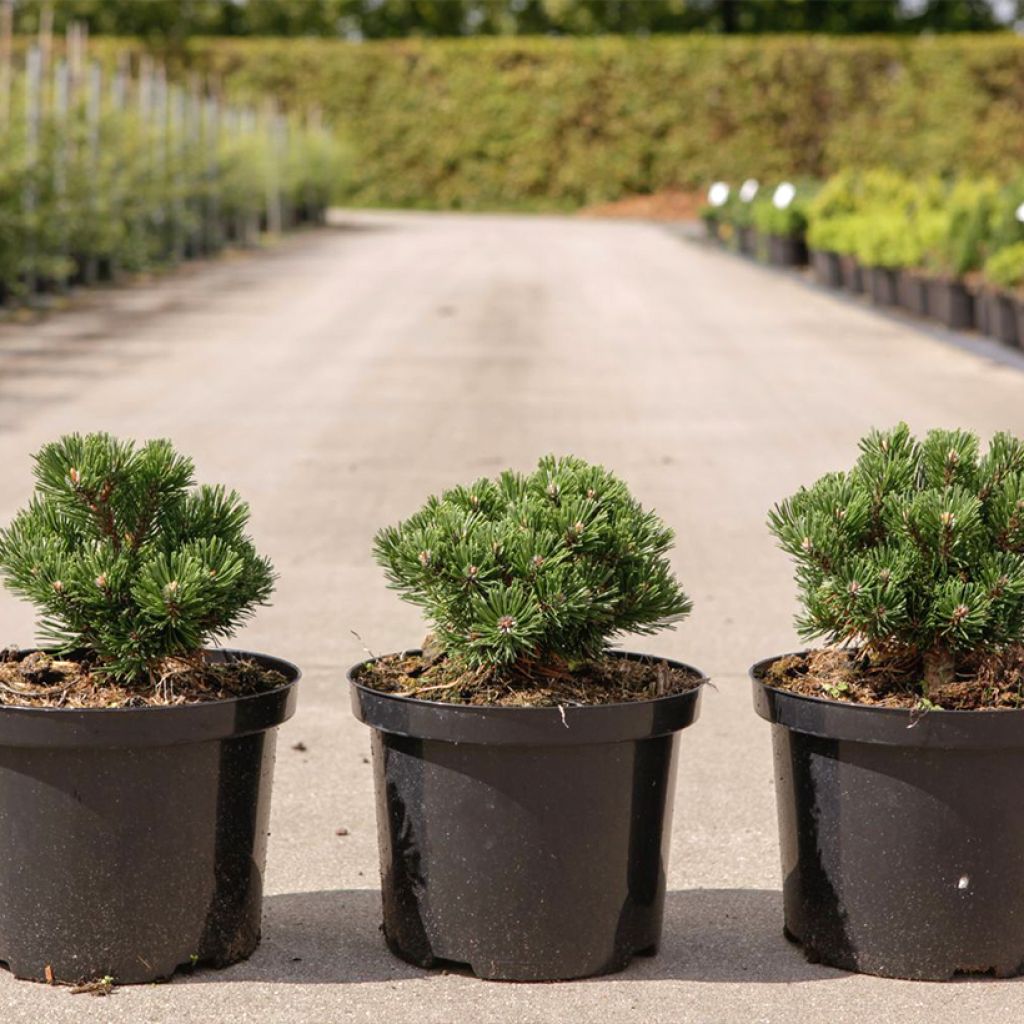

Pinus mugo Sherwood Compact - Dwarf Mountain Pine
Pinus mugo Sherwood Compact - Dwarf Mountain Pine
Pinus mugo Sherwood Compact
Dwarf Mountain Pine, Swiss Mountain Pine, Mugo Pine
Beautiful little specimen (more abundant than in the stock photo), clearly in good health. The packaging was very well designed, thankfully, as the baby pine didn't always travel with its head up! I hope it will thrive in my garden.
Thierry, 03/02/2024
This item cannot be shipped to the selected country
Delivery charge from €5.90
Delivery charge from €5.90
Delivery to Corse prohibited
More information
Schedule delivery date,
and select date in basket
This plant carries a 24 months recovery warranty
More information
We guarantee the quality of our plants for a full growing cycle, and will replace at our expense any plant that fails to recover under normal climatic and planting conditions.
From €5.90 for pickup delivery and €6.90 for home delivery
Express home delivery from €8.90.
From €5.90 for pickup delivery and €6.90 for home delivery
Express home delivery from €8.90.
Delivery to Corse prohibited: UE law prohibits the import of this plant from mainland France to Corse as part of the fight against Xylella fastidiosa. Please accept our sincere apologies.
More information
Does this plant fit my garden?
Set up your Plantfit profile →
Description
The Pinus mugo 'Sherwood Compact' is a dwarf form of the mountain pine, with a particularly decorative habit. Its dark green needles, rigid and slightly twisted, densely cover its short branches, giving this small conifer a hedgehog-like appearance. Slow-growing, it spreads to form a cushion that is one and a half times wider than it is tall, with a very dense growth. A graphic plant par excellence, very hardy and not demanding in terms of soil, it will be perfectly at home in a rockery or a contemporary garden.
The Pinus mugo, also known as the mountain pine, is an evergreen conifer in the Pineaceae family, endemic to the European mountains. It is found in the subalpine zone, avoiding summer heat, from the Spanish sierras, through the high Alpine and Pyrenean massifs, to the Balkans. It only descends to an altitude of 200 meters (656 feet 2 inches) in Central Europe. In nature, it slowly reaches 3 to 4 meters (9 feet 10 inches to 13 feet 1 inches) in all directions, adopting a tousled silhouette that reflects its wind-swept habitat. It is a very hardy species, well adapted to the mountain climate. It is also called the creeping pine due to its very knotty wood and often creeping branches.
This 'Sherwood Compact' variety is distinguished from the wild species by its reduced size, its compact spreading habit, and its beautiful decorative foliage. The dark green needles, short and rigid, are slightly curved upwards and evenly distributed throughout the diameter of the branches, resembling bottle brushes. The sight of these slender leaves surrounding the lovely small brownish-purple cones that form at the end of branches is simply delightful. As the branches are of different lengths, they create an irregular surface that provides a particularly interesting aesthetic for a contemporary garden.
Slow-growing like most of its cousins, this 'Sherwood Compact' mugo pine will form a spreading cushion of 1 meter (3 feet 4 inches) in height and 1.50 meters (4 feet 11 inches) in width in the space of ten years. Very adaptable in terms of soil, which can be acidic, neutral, or alkaline, as well as moist, even wet, to moderately dry. It prefers full sun, but can tolerate light shade. Very cold-resistant (-30°C (-22 °F)) as well as wind-resistant, it is not afraid of snow. This robust conifer will be equally at home in an urban garden or in the fresh air of the countryside exposed to harsh weather conditions.
The 'Sherwood Compact' mountain pine is an excellent choice for rockeries, where its small size and characteristic habit will shine among light-coloured rocks. You can also plant it in a container to enhance a terrace (in this case, monitor watering in summer, as these growing conditions can be more drying than in open ground). Its unique design will also be valued in a Japanese garden, as well as, of course, in a contemporary garden. It can be associated with grasses, such as Pennisetum alopecuroides Moudry with dark spikes, whose lightness and movement in the wind will contrast with the rigidity of our little pine. Other dwarf conifers with a prostrate habit or shrubs with foliage as graphic as its own will also be good companions. The bright leaves of the 'Illumination' periwinkle will go well with the dark mass of this mugo pine, without stealing the show from it.
Report an error about the product description
Plant habit
Flowering
Foliage
Botanical data
Pinus
mugo
Sherwood Compact
Pinaceae
Dwarf Mountain Pine, Swiss Mountain Pine, Mugo Pine
Cultivar or hybrid
Other Pinus - Pine
Planting and care
The Pinus mugo 'Sherwood Compact' can be planted from September to November and from February to April in well-drained, moist, even poor soil, whether slightly calcareous or, on the contrary, peaty and acidic. It only fears excessively dry soils in summer and scorching temperatures. Choose a sunny location, or possibly partial shade.
Soak the root balls well before planting. Optionally, add organic amendment to the planting hole and water generously in the first years, and in case of prolonged drought. It is advisable to mulch the soil to maintain some freshness in summer. You can also apply a special conifer fertilizer every year in April, even if this conifer can tolerate poor soils.
Due to its slow growth and characteristic habit that makes it highly decorative, it is best not to prune this conifer.
Planting period
Intended location
Care
-
, onOrder confirmed
Reply from on Promesse de fleurs
Conifers
Haven't found what you were looking for?
Hardiness is the lowest winter temperature a plant can endure without suffering serious damage or even dying. However, hardiness is affected by location (a sheltered area, such as a patio), protection (winter cover) and soil type (hardiness is improved by well-drained soil).

Photo Sharing Terms & Conditions
In order to encourage gardeners to interact and share their experiences, Promesse de fleurs offers various media enabling content to be uploaded onto its Site - in particular via the ‘Photo sharing’ module.
The User agrees to refrain from:
- Posting any content that is illegal, prejudicial, insulting, racist, inciteful to hatred, revisionist, contrary to public decency, that infringes on privacy or on the privacy rights of third parties, in particular the publicity rights of persons and goods, intellectual property rights, or the right to privacy.
- Submitting content on behalf of a third party;
- Impersonate the identity of a third party and/or publish any personal information about a third party;
In general, the User undertakes to refrain from any unethical behaviour.
All Content (in particular text, comments, files, images, photos, videos, creative works, etc.), which may be subject to property or intellectual property rights, image or other private rights, shall remain the property of the User, subject to the limited rights granted by the terms of the licence granted by Promesse de fleurs as stated below. Users are at liberty to publish or not to publish such Content on the Site, notably via the ‘Photo Sharing’ facility, and accept that this Content shall be made public and freely accessible, notably on the Internet.
Users further acknowledge, undertake to have ,and guarantee that they hold all necessary rights and permissions to publish such material on the Site, in particular with regard to the legislation in force pertaining to any privacy, property, intellectual property, image, or contractual rights, or rights of any other nature. By publishing such Content on the Site, Users acknowledge accepting full liability as publishers of the Content within the meaning of the law, and grant Promesse de fleurs, free of charge, an inclusive, worldwide licence for the said Content for the entire duration of its publication, including all reproduction, representation, up/downloading, displaying, performing, transmission, and storage rights.
Users also grant permission for their name to be linked to the Content and accept that this link may not always be made available.
By engaging in posting material, Users consent to their Content becoming automatically accessible on the Internet, in particular on other sites and/or blogs and/or web pages of the Promesse de fleurs site, including in particular social pages and the Promesse de fleurs catalogue.
Users may secure the removal of entrusted content free of charge by issuing a simple request via our contact form.
The flowering period indicated on our website applies to countries and regions located in USDA zone 8 (France, the United Kingdom, Ireland, the Netherlands, etc.)
It will vary according to where you live:
- In zones 9 to 10 (Italy, Spain, Greece, etc.), flowering will occur about 2 to 4 weeks earlier.
- In zones 6 to 7 (Germany, Poland, Slovenia, and lower mountainous regions), flowering will be delayed by 2 to 3 weeks.
- In zone 5 (Central Europe, Scandinavia), blooming will be delayed by 3 to 5 weeks.
In temperate climates, pruning of spring-flowering shrubs (forsythia, spireas, etc.) should be done just after flowering.
Pruning of summer-flowering shrubs (Indian Lilac, Perovskia, etc.) can be done in winter or spring.
In cold regions as well as with frost-sensitive plants, avoid pruning too early when severe frosts may still occur.
The planting period indicated on our website applies to countries and regions located in USDA zone 8 (France, United Kingdom, Ireland, Netherlands).
It will vary according to where you live:
- In Mediterranean zones (Marseille, Madrid, Milan, etc.), autumn and winter are the best planting periods.
- In continental zones (Strasbourg, Munich, Vienna, etc.), delay planting by 2 to 3 weeks in spring and bring it forward by 2 to 4 weeks in autumn.
- In mountainous regions (the Alps, Pyrenees, Carpathians, etc.), it is best to plant in late spring (May-June) or late summer (August-September).
The harvesting period indicated on our website applies to countries and regions in USDA zone 8 (France, England, Ireland, the Netherlands).
In colder areas (Scandinavia, Poland, Austria...) fruit and vegetable harvests are likely to be delayed by 3-4 weeks.
In warmer areas (Italy, Spain, Greece, etc.), harvesting will probably take place earlier, depending on weather conditions.
The sowing periods indicated on our website apply to countries and regions within USDA Zone 8 (France, UK, Ireland, Netherlands).
In colder areas (Scandinavia, Poland, Austria...), delay any outdoor sowing by 3-4 weeks, or sow under glass.
In warmer climes (Italy, Spain, Greece, etc.), bring outdoor sowing forward by a few weeks.

































